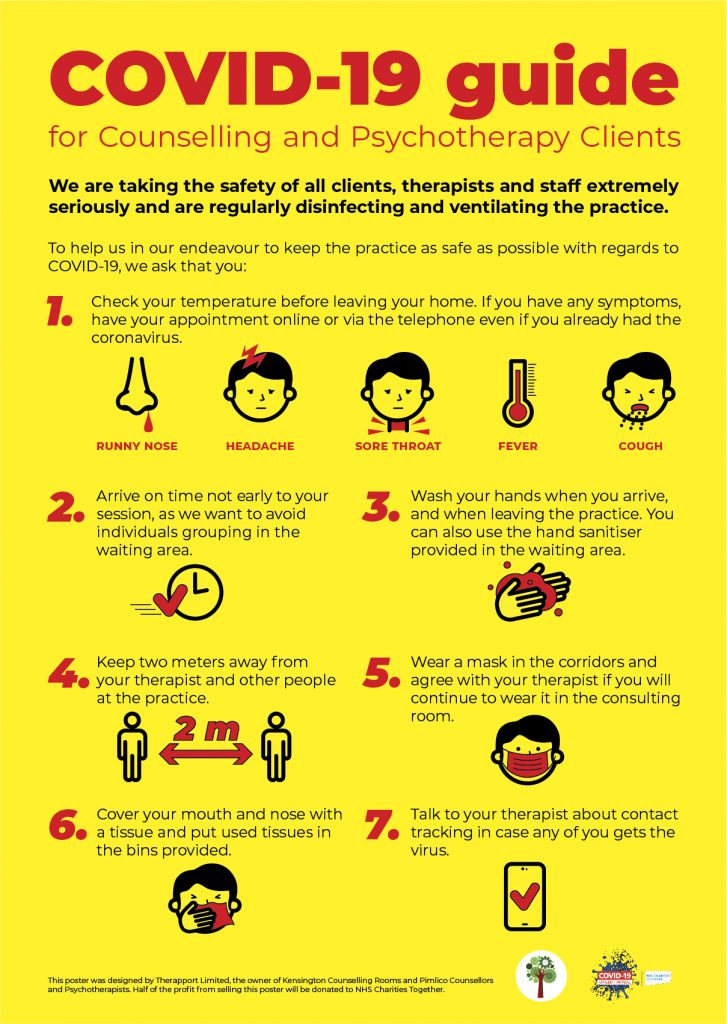The current pandemic has impacted various areas of our lives including how and where we access counselling. Although initially, the majority of sessions moved to the online domain, clients and therapists are more often considering restarting face to face sessions. This guide is an outcome of a study that Kensington Counselling Rooms along with Pimlico Counsellors and Psychotherapists did to ensure our practices offer the highest standard of virus control.
In preparation, we have reviewed the governmental requirements, Counselling and Psychotherapy Union guidelines, undertaken the coronavirus risk assessment, and spoken to our colleagues in Italy and Poland that are already working face to face.
Is it safe to see a counsellor face to face?
We are confident that following these guidelines, the risk of passing the coronavirus in the counselling practices will be low. However, there are specific steps that each private practice needs to take to enable working in the same physical space. Please check with the practice management if there is a coronavirus risk assessment in place. Even though the infection may be minimised within the counselling practice, a higher risk may appear on the way to get there. Clients and counsellors should consider their own safety before deciding to work face to face.
When to start working face to face?
The government has not explicitly prohibited offering face to face therapy, and in fact, some of the most emotionally vulnerable clients were seen face to face during the lockdown. Even though most of the shops and hair salons are now operational, each therapist and client will need to make an individual decision based on the risk. Therapists and clients who are in more vulnerable groups or who cannot easily access the practice may carry on working online for longer.
To make sure that a private practice is ready for working offline, it needs to have rigorous procedures in place including a specific cleaning schedule.
How to increase the safety of a counselling practice during the coronavirus epidemic?
Each counselling practice will have to go through a rigorous assessment of what needs to be changed to enable safer working during the epidemic.
Below are the most frequent considerations:
- Waiting areas may need to be closed. Waiting areas used to be meditative for some clients while for others offered nothing more than a rain shelter, now they may need to remain closed and clients may be requested to come on time of their appointment.
- If working in a larger practice, therapists may be requested to change the time of their appointments to make sure that clients arrive at different times.
- If possible, a one-way system should be developed to enable clients to stay away from each other and use different doors for accessing and leaving the practice.
- Hand sanitisers should be available at the entrances and exits, and clients and staff should be encouraged to use them.
- Reception and other areas where staff work on a regular basis may need to be protected by screens or temporary walls.
- Therapists should have discussions with their clients about what to do if either of them is diagnosed. The government was not able to deliver the application that could have made the tracing clearer for our clients. Since contact application cannot be used, we need to discuss if, how and when can we disclose the client’s names and contact details to the infection contact tracers or our will executor. I think that calling our clients when having high fever and covid anxiety should be out of the question, so I suggest you get in touch with you will executor to make sure you have a procedure for when this happens.
- Clients and therapists must have procedures in place to quickly move sessions online if any of them develops symptoms. I would suggest that each therapist carries with them a charged device ready for online work even though they scheduled a face to face meeting. E.g. our coronavirus poster encourages clients to check their temperature before leaving for the appointment (see poster below).
- Cleaning rotas and schedules. Therapists may be requested to ventilate the space and use an antiviral wipe or spray to clean surfaces after each client. Furthermore, each private practice needs a cleaning rota for common areas that include door handles, bathrooms, etc. How often the practice is cleaned should be determined by the number of clients and therapists using the practice.
- If a therapy room does not offer a comfortable two-meter distance or appropriate ventilation, it may not be suitable for face to face counselling and should be dedicated to teleconferencing only.
- Each practice should identify the procedure for appointing a professional antiviral cleaning company if required.
- Rubbish should be removed more frequently during the crisis.
- Some facilities, e.g. water cooler may not be available.
- Practices need a good stock of single used gloves, aprons, antiviral sprays, wipes, and paper towels.
- Soft furnishing would need either to be protected (we used cat scratch plastic covers on the arms) or regularly disinfected using a spray that can be applied to soft furnishing, e.g. Dettol All-in-one.
- Communication with clients and therapists will be crucial during this time. Practices may use posters, stickers, emails and telephone to prepare both therapists and clients for the new normal. We have designed our own floor stickers showing 2-meter distance and a poster with info for clients (see below). Feel free to download the poster and send it to your clients.

Implementing the above steps require consultations and training. Each counsellor and staff working at the practice must be aware and have agreed to these changes. With the influx of counselling clients that are expected after the coronavirus pandemic, counselling and psychotherapy practices must have procedures in place to minimise the possibility of infections.
If you are looking for a counselling room to rent that is coronavirus ready, please find more info here.
